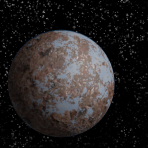| Proper Names | Gonggong (originally provisionally named 'Snow White') | | Minor Planet Designation | 225088 Gonggong | | Provisional Designation | 2007 OR10 | | Orbital Period | 546.6 years | | Distance from the Sun | Semi-Major Axis: 10,014,824,000 km (66.94 AU)
Perihelion: 4,987,535,000 km (33.34 AU)
Aphelion: 15,042,114,000 km (100.55 AU)
| | Eccentricity | 0.5064 | | Rotation Period | Not known | | Diameter | Uncertain; probably 1,000 - 1,500 km | | Temperature | 31K (-242°C) | | Moons | Xiangliu | | Parent star | The Sun, yellow dwarf | | Other planets in this system | Mercury, terrestrial planet
Venus, terrestrial planet
Earth, terrestrial planet
Mars, terrestrial planet
Jupiter, gas giant
Saturn, gas giant
Uranus, ice giant
Neptune, ice giant
Numerous dwarf planets, asteroids and other bodies
| | Notes | A planetoid more than a thousand kilometres in diameter, whose highly eccentric orbit carries it more than a hundred times the Earth's distance from the Sun. |

Possible appearance of the dwarf planet Gonggong, with a reddened surface due to the presence of frozen methane. Given its diameter, this object is probably spherical, though details of its shape are not presently known.
A mysterious body that orbits through the distant reaches of the Solar System, pursuing an orbital path in the form of an elongated ellipse. At its closest approach to the Sun, its distance is only marginally greater than that of Neptune, but from that point it travels further outward than any other known body. It is currently following this outward path, and will eventually reach a point more than 100 AU from the Sun before it begins the inward leg of its Solar orbit. For comparison, Pluto's aphelion (its greatest distance from the Sun) is 48.9 AU, less than half that of Gonggong.
The general characteristics of this object imply that it belongs to the category defined as 'dwarf planets', though this determination has yet to be made with certainty. Both its mass and dimensions remain somewhat unclear, but it appears to be between 1,000 and 1,500 kilometres in diameter. Assuming that it does qualify as a dwarf planet, this places it among the smaller members of that class, very roughly half the size of comparable bodies like Pluto or Eris.
On its discovery, Gonggong was nicknamed 'Snow White' on the assumption that an object travelling so far from the Sun would be swathed in ices. This is indeed the case, but the methane ice that covers its surface is not white; instead, physical reactions have turned it a deep dark red in colour. There is reason to think that this body may have a weak atmosphere of gaseous methane. Gongong possesses a single small moon, named Xiangliu, estimated to be approximately one hundred kilometres in diameter and orbiting Gonggong at a distance of some 15,000 km.
|
|